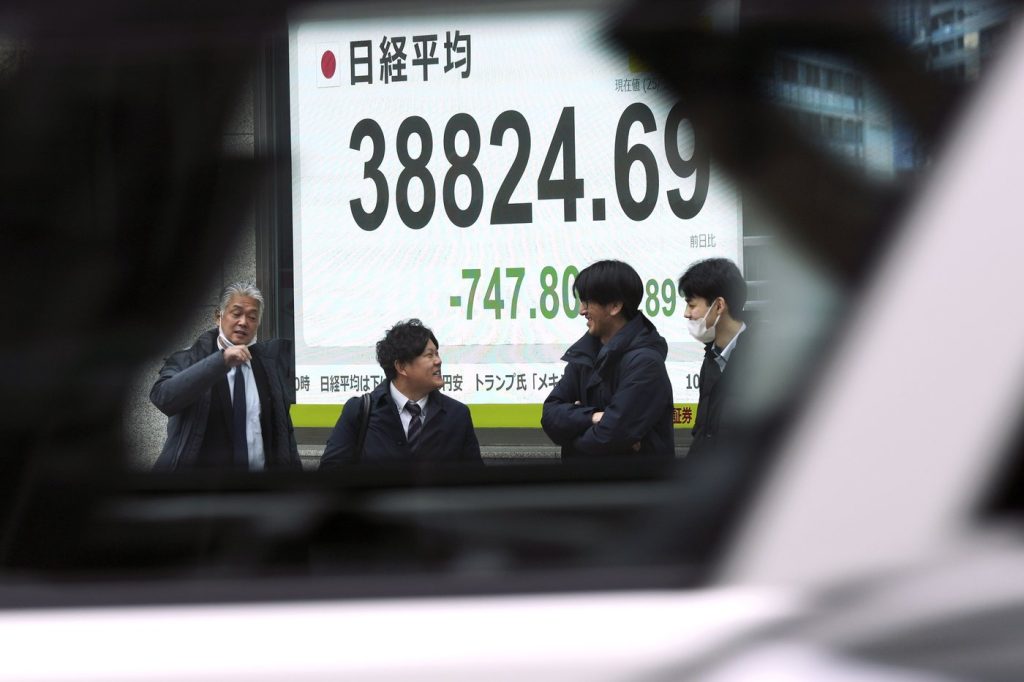TOKYO (AP) – Asian shares faced a downturn in Monday trading, driven by concerns over President Donald Trump's intentions to impose tariffs on key U.S. trading partners. The financial markets reacted negatively, reflecting the heightened anxiety surrounding a potential trade war escalation.
In Japan, the benchmark Nikkei 225 saw a significant drop of 2.4%, reaching 38,612.96 points. Australia’s S&P/ASX 200 declined by 1.8% to settle at 8,376.30. South Korea’s Kospi experienced a considerable fall of 2.9%, landing at 2,443.57. Similarly, Hong Kong’s Hang Seng index dipped 1.4% to 19,942.54, while the Shanghai Composite index also decreased slightly, closing at 3,250.60. Analysts believe that Asian markets are bracing for potential volatility following the trade war fears, which could have far-reaching implications.
Yeap Jun Rong, a market strategist at IG, commented on the matter, stating, “The implications for trade restrictions could result in reduced global trade flows, supply chain shifts which could mean higher costs for businesses, and higher inflation.” This sentiment encapsulates the broader concerns impacting investors and market trends across the region.
In the United States, Wall Street faced declines in the previous week, with the S&P 500 falling by 0.5%. The Nasdaq composite followed suit with a 0.3% drop, marking the first weekly loss in three weeks for both indexes. The Dow Jones Industrial Average faced a steeper decline, dropping by 0.8%. Notably, around 75% of the stocks within the S&P 500 closed lower, with technology and energy companies contributing significantly to the losses.
Investor sentiment was further shaken by a report from the Chinese startup DeepSeek, which announced the development of a more affordable large language model that could compete globally. This revelation raised questions regarding the anticipated investments in AI chips, causing a notable decline in certain technology shares.
Starting Tuesday, President Trump's administration's proposed tariffs will take effect—25% on most imports from Canada and Mexico, and 10% on goods from China. The rationale behind these tariffs remains vague as the administration has not clarified the specific improvements needed to cease the tariffs related to illegal immigration and fentanyl smuggling.
In retaliation, both Canada and Mexico have announced their own tariffs on American goods, with Canada set to implement tariffs on a range of products commencing Tuesday, though specifics have yet to be disclosed.
The looming tariff concerns also affected long-term bond yields—specifically, the 10-year Treasury yield rose to 4.54%, up from 4.52% late Thursday. Overall, yields have been on an upward trend since September, bolstered by an unexpectedly robust U.S. economy, affirming market observations.
Additionally, the U.S. Federal Reserve decided to keep its benchmark interest rate unchanged, signaling a cautious approach regarding the potential effects of Trump's policies on inflation and the broader economy.
In energy trading, benchmark U.S. crude prices surged by $1.10 to close at $73.63 per barrel, while Brent crude—the international standard—rose by 40 cents, concluding at $76.07 per barrel. Currency markets showed the U.S. dollar slightly strengthened against the Japanese yen, increasing to 155.55 yen from 155.18. Meanwhile, the euro depreciated to $1.0226 from $1.0363.
As anxiety over trade policies and economic repercussions continues to grip investors, the unfolding events emphasize the interconnectedness of global markets and the potential ripple effects of tariff impositions. The impacts on various sectors and international relations will warrant close scrutiny in the coming days.










